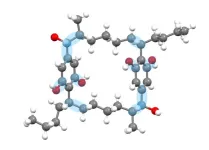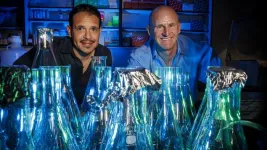Resveratrol – a naturally occurring ingredient found in grapes, blueberries, raspberries and peanuts – will be tested as a potential cancer prevention drug as part of the Cancer Research UK-funded COLO-PREVENT trial.
The trial is led from the University of Leicester and the National Institute for Health and Social Care Research (NIHR) Leicester Biomedical Research Centre.
The trial is testing multiple potential prevention drugs for bowel cancer, including aspirin and metformin. Previous studies led by Professor Karen Brown at the University of Leicester have found that purified resveratrol can inhibit the growth of cancer cells in small doses*. Through years of painstaking research, she’s found that resveratrol can reach the bowel undigested and that it slows down tumour growth in mice and human tissue samples.
These findings have led to the COLO-PREVENT trial to find out if drugs like aspirin and food supplements like resveratrol are a viable route to preventing bowel cancer.
This clinical trial, and previous research it is based on, uses purified resveratrol and not red wine. Drinking red wine does not prevent cancer. Alcohol is a known cause of cancer and is linked to an increased risk of 7 different types of cancer.
Professor of Translational Cancer Research at the University of Leicester and lead on the COLO-PREVENT trial, Professor Karen Brown, said:
“Screening has made huge progress in picking up bowel cancers in those most at risk. But to improve outcomes further, we need to prevent more bowel cancers emerging in the first place.
“The best way to prevent bowel cancer right now is to improve our lifestyles – stopping smoking, maintaining a healthy weight, reducing alcohol consumption and having a healthy, balanced diet. But we can enhance those efforts by embracing therapeutic prevention, which uses our growing knowledge of the biology of cancer to find drugs which can stop it in its earliest stages.
“With the COLO-PREVENT trial, we are embarking on a unique experiment to see how drugs could stop bowel polyps from growing. This trial could have big implications for how we prevent bowel cancer in people who are most likely to develop the disease as they get older.”
Over the coming years, the COLO-PREVENT trial will recruit 1,300 patients at 60 locations in England and Wales. The trial is recruiting people aged 50-73 who have taken part in the NHS Bowel Screening Programme and have polyps – small growths in the lining of the bowel which could become cancer in the future.
Participants in the trial will have their polyps removed and will then receive a treatment – either aspirin or aspirin and metformin in the main trial or resveratrol or a placebo in the sub-study. Those receiving aspirin or aspirin and metformin will take these drugs daily over three years, while those on resveratrol or the dummy tablet will take it for a year. Afterwards, all groups will be given colonoscopies to see if polyps have started growing again, and if so, how big they are compared to the ones removed at the start of the trial.
If the trial is successful, any of the treatments tested could be offered to people eligible for the NHS Bowel Screening Programme to reduce the chance of bowel polyps forming, and with that reduce the risk of bowel cancer in the future.
David Trusler (66) from Market Harborough in Leicestershire is one of the first patients to take part in the COLO-PREVENT trial. Eleven years ago, David was diagnosed with prostate cancer.
“To me, being diagnosed with prostate cancer was like being in a Hitchcock horror movie. I heard the words 'you have cancer', I hardly heard anything after that and then when I left the room, my legs went from under me.”
David had surgery to remove his prostate. The treatment was successful and his prostate cancer has not returned.
“When I had prostate cancer, I was truly amazed by the level of care I had from the NHS. Fourteen specialists, doctors, nurses all looking after me! I vowed afterwards that I would do anything I can to help people in a similar situation.”
David has been taking part in the NHS Bowel Screening programme since 2018 and had returned normal results until recently. In June 2024, the screening test handed back an abnormal result and he was invited for a colonoscopy.
“My first thought was 'oh no, not again.’ I was really nervous about what they might find, though I was really impressed at how quickly they brought me in for a colonoscopy after I got my results back.
David was relieved to find out that the doctors hadn’t found cancer – but the colonoscopy revealed two large polyps. These polyps could become cancer in the future. It was at that point that he was invited to join the Cancer Research UK-funded COLO-PREVENT trial.
“I lost my dad when I was 17 to bowel cancer. We had such a strong bond. I’ll never forget how angry it made me to lose that time with him.
“When my dad was diagnosed in the 1970s, there was no MRIs, no ultrasound. Many of the advances in cancer treatment we have now simply didn’t exist then.
“I’m taking part in this trial for my dad, to give future generations the kind of treatments he never had.”
Consultant Gastroenterologist at Kettering General Hospital and chief investigator of the COLO-PREVENT trial, Dr Ajay Verma, added:
“The holy grail of cancer care is cancer prevention. The COLO-PREVENT study is an exciting new way to test cancer prevention in a much wider group of people, for a cancer which claims thousands of lives every year.
“Aspirin and metformin are well-established drugs but they have never been tested with people who’ve taken part in the Bowel Screening programme. Resveratrol is newer and, thanks to the work of Karen’s team in Leicester, is now a viable candidate prevention drug for clinical trials.
“I’m delighted to welcome our first participants to COLO-PREVENT. This trial could change how we manage patients with polyps detected through bowel cancer screening and potentially reduce the number which become cancer in the future.”
Professor of Molecular Gastroenterology at the University of Leeds and principal investigator on the COLO-PREVENT trial, Professor Mark Hull, said:
“When bowel polyps are identified, removing them does not guarantee that they won’t come back, or become cancer in the future. Through therapeutic prevention, we’re trying everything that we can to reduce the risk of cancer and the COLO-PREVENT trial is just one way in which we are doing that.”
Executive Director of Research and Innovation at Cancer Research UK, Dr Iain Foulkes, said:
“This trial opens the door to a new era of cancer research, where cancer becomes much more preventable through cutting-edge science.
“The COLO-PREVENT trial is one of the biggest trials into therapeutic prevention in the UK. The insights gained from the trial will change how we think about cancer prevention and give more people the chance of longer, better lives, free from the fear of cancer.”
ENDS
For media enquiries, contact Graeme Sneddon in the Cancer Research UK press office on 07827936507 or, out of hours, on 020 3469 8301.
Notes to Editor
Pictures of Professor Karen Brown and David Trusler are available from this link. Please credit the image of Karen Brown to Cancer Research UK and credit the image of David Trusler to David Trusler.
* https://www.ncbi.nlm.nih.gov/pmc/articles/PMC4827609/
About Cancer Research UK:
Cancer Research UK is the world’s leading cancer charity dedicated to saving lives through research, influence and information.
Cancer Research UK’s pioneering work into the prevention, diagnosis and treatment of cancer has helped save millions of lives.
Cancer Research UK has been at the heart of the progress that has already seen survival in the UK double in the last 50 years.
Today, 2 in 4 people survive their cancer for at least 10 years. Cancer Research UK wants to accelerate progress and see 3 in 4 people surviving their cancer by 2034.
Cancer Research UK supports research into the prevention and treatment of cancer through the work of over 4,000 scientists, doctors and nurses.
Together with its partners and supporters, Cancer Research UK is working towards a world where people can live longer, better lives, free from the fear of cancer.
For further information about Cancer Research UK's work or to find out how to support the charity, please call 0300 123 1022 or visit www.cancerresearchuk.org. Follow us on Twitter and Facebook
END



